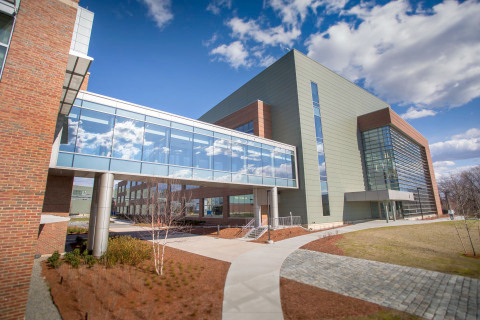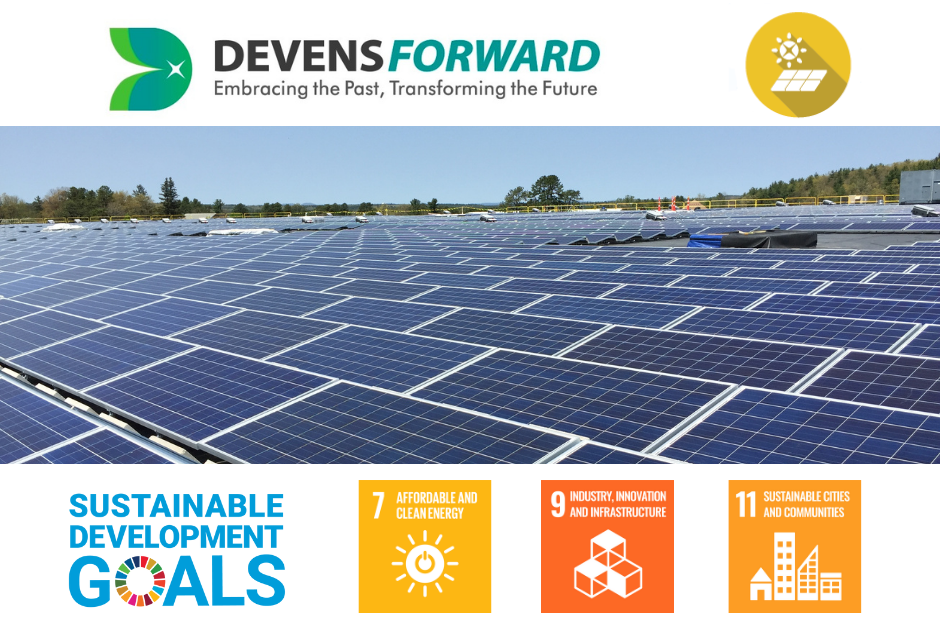The purpose of this SDG Connection blog series is to illustrate how communities like Devens can play an important role in acting locally to address our planetary needs, as called for in the United Nation’s Sustainable Development Goals. In this month’s blog I will explain how energy efficiency in Devens impacts global climate change and provide a few tips to lower emissions from buildings. Having put myself through graduate school as an energy auditor and working early in my career as a municipal energy coordinator, the connection between energy efficient buildings and the UNSDGs resonates with me.
Why Should Residents and Businesses Care about Energy Efficiency?
There are two levers for change when it comes to reducing greenhouse gas (GHG) emissions in the energy sector: reducing the amount of energy we use (energy efficiency) and where we get our energy from (zero-carbon/clean energy).
Building energy makes up the biggest proportion of GHGs in Devens (94%), making it a very important area to address in order to fight climate change.
SDG Connection: How Energy is Connected to Climate Change
The Devens ReUse Plan adopted in 1994 (Master Plan of redevelopment), calls for Devens to become a model for the sustainable redevelopment of a former army base. Our regulatory environment supports the Devens’ commitment to reducing greenhouse gas emissions from buildings by reducing energy use through energy efficiency measures as part of the Devens Forward Plan.
How much energy we use in buildings in Devens has an impact on global climate and can help us to achieve the UN SDGs, including:
- SDG 7: Affordable and Clean Energy
- SDG 9: Industry, Innovation, and Infrastructure
- SDG 11: Sustainable Cities and Communities
Building a Sustainable Future in Devens
Our Energy Use and Greenhouse Gas Emissions
Currently, GHGs from natural gas usage exceed those from electricity in the residential, commercial, and institutional facilities across Devens. A key strategy to reduce overall emissions is to shift energy sources away from direct fossil fuel use, like by switching from natural gas to electricity. As the electric grid becomes cleaner, emissions from electricity use will come down as well, even as we start to use more electricity. Our Devens municipal utility expects to achieve 50% renewably sourced electricity by 2030.
Our large industrial base has resulted in high building energy use. While building energy use is high, when compared to the State of Massachusetts as a whole, Devens is less carbon intense for the value of what is produced here.
Better Buildings: What Devens is Doing
We are taking measures to reduce energy consumption across all building types in Devens. These include a mixture of incentives, regulations and education. Because of high building standards required through our Regulations in Devens, the number of LEED certified or certifiable building square footage has nearly doubled between 2012 and 2017. Through our Regulations and permitting process, we require most new industrial buildings to be constructed to high performance building standards. Leadership in Energy Efficiency and Design (LEED) is a rating system which certifies building energy performance.
Devens is taking action as part of the Devens Forward Plan to increase energy efficiency in buildings through:
- Engaging Devens businesses to share and promote results of energy efficiency and sustainability projects.
- Promoting energy efficiency upgrades in residential and commercial buildings through incentives and education and partnerships with programs such as the Industrial Assessment Center.
- Encouraging new and redevelopment projects regularly incorporate green infrastructure, low impact development, and water and energy efficiency measures.
Spotlight: Businesses in Devens Leading the Way
Through their decision to locate at Devens, businesses are paving the way toward more energy efficient buildings. Bristol-Myers Squibb (BMS) shares a common mission with Devens, a commitment to sustainable development. BMS took action on their vision and received LEED Gold for its laboratory and office building and LEED Silver for its manufacturing facility. The manufacturing facility is expected to consume 11% less energy compared to a building of a similar size and use.

Bristol-Myers Squibb expanded its presence in Devens while reducing its footprint.
Spotlight: Green Housing In Devens
In our growing residential sector, Devens is working to develop innovative housing built to high energy standards. In 2012 a partnership between MassDevelopment and DEC was created to show that high performance residential housing could be constructed with little to no cost differential from traditional home construction. Eight single family units of zero-net energy homes were constructed that produced more energy than they consumer over a year, with Home Energy Rating System (HERS) ratings between -36 and 8, and twelve town houses were constructed with a HERS score of 35 (housing constructed to building code achieves a HERS of around 85). Building off the success of this pilot project, the Devens Enterprise Commission created a set of Innovative Residential Development Regulations modeled after the LEED for Neighborhood Development rating system that resulted in the development of 124 more units of highly energy efficient single and multi-family homes in a compact, walkable, and connected neighborhood designed for people first.
Environmental Planner Neil Angus interviewed one of the pilot project homeowners.
What Can Residents and Businesses do to Make an Impact?
Everyone in Devens can do their part to reduce energy use:
- Switch to LEDs in your home or business to use less energy, save money, and change your lights less frequently
- Purchase ENERGY STAR appliances and take advantage of rebates to save on upfront costs
- Install a smart, programmable thermostat to adjust temperature settings for optimal efficiency
- Turn the heat down by 2 degrees to save on your heating bill
- Turn off lights or unplug electronics when not in use
- Consider installing a heat pump
I encourage readers to stay tuned for blogs each month, to check out the actions in the Plan if they want more information about what Devens is doing toward energy efficiency, and take action as part of Energy Efficiency Day on October 6th.
Previous Post
Green Team Roundtable: Redirecting Waste Streams
Next Post
Sustainable Business Spotlight: SMC

